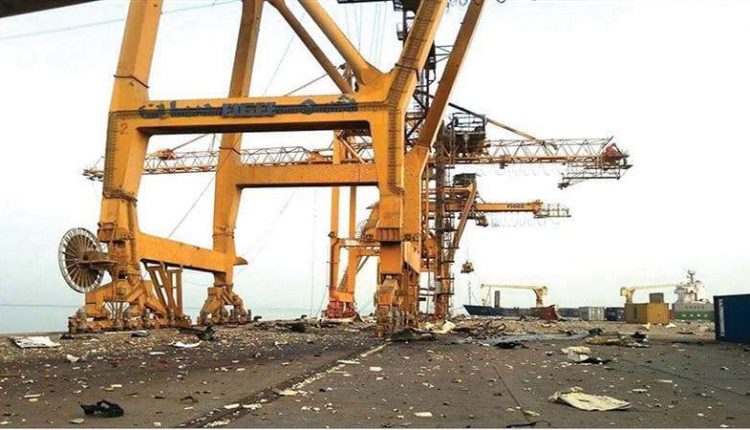Bombing, Siege of Port of Hodeidah, Six Years of US Restrictions
Six years have passed since the disgraceful targeting of the port of Hodeidah by the forces of the American-Saudi aggression, which came as part of a comprehensive targeting of all the necessities of life in the country; with the aim of forcing the Yemenis to surrender early.
In conjunction with this anniversary, the targeting is still present.
The embargo imposed on our country by US Navy ships is the most prominent problem facing maritime traffic and the arrival of ships to the port of Hodeidah, especially fuel derivatives ships, in clear violation of international and international covenants. But despite all that, Sana’a repeatedly confirms the port’s readiness to receive container cargo ships, despite the obstacles and pitfalls that the aggression places in front of the import movement.
The Red Sea Ports Corporation took advantage of the occasion of the sixth anniversary of the targeting of the port of Hodeidah to confirm, in a statement, on Tuesday, the port’s readiness to receive container ships, while granting all concessions and facilities to importers. It explained that the institution’s fees,services and facilities are lower in terms of price among all Yemeni ports.
The Red Sea Ports Corporation indicated that the US-Saudi aggression continued to detain oil tankers for more than a year.
This detention led to a decline in the level of services and necessities of life in the various governorates. It stressed that this comes in light of international silence, blatant complicity and a violation of international laws. It held the United Nations, its envoys and relevant organizations responsible for what civilians are exposed to and for their lack of urgent action to stop the piracy of food, relief and fuel derivatives ships.
With the beginning of the US-Saudi aggression on our country, the port of Hodeidah was directly targeted by aggression’s aircraft.The container cranes, hangers, and ship maintenance chutes were targeted, as well as the boats and boats of the Red Sea Ports Corporation, including the boat of the United Nations. The aggression also targeted commercial ships carrying foodstuffs to the people.
This attack on the port was repeated in 2018, when the eastern gate of the port of Hodeidah, designated for the entry and exit of trucks transporting food and medicine from the port to the governorates and regions of the republic, was targeted. The missile targeted the agriculture office in the port, causing damage to buildings.
It is noteworthy that the targeting of the port came in conjunction with the visit of the Executive Director of the World Food Program, who was visiting Hodeidah at the time, and his warning in a press statement against the consequences of targeting the port. This indicates that the targeting was deliberate, and it is a challenge to the United Nations and the international community that they do not care about the issue of human and other suffering that could afflict Yemen as a result of this targeting.
Gateway to starving Yemenis
The US-Saudi aggression deliberately disrupted the port of Hodeidah, and targeted it directly during the past years; with the aim of starving and subjugating Yemenis. Considering that the port is the main artery for the entry of goods and commodities by sea to the free zones, and therefore the blockade of the port and not allowing the entry of fuel, goods, medicines and others through it, leads to restrictions and suffocation of millions of Yemenis, who find it difficult to obtain all these commodities as a result of the blockade.
Although the Stockholm Agreement, sponsored by the United Nations in 2018, stipulates the necessity of the flow of food, relief and oil derivatives through the port of Hodeidah. However, this was one of the constant obstacles and violations of the forces of aggression and mercenaries, who did not implement any clause of the agreement, continuing to put obstacles and bumps in front of the port in order to achieve what they were unable to achieve on the military side.
The forces of aggression and mercenaries control the Yemeni ports and islands along the Yemeni territorial waters and the Red Sea coast, which gives them the ability to put obstacles in the way of the movement of ships, or to grant permits to cross them to the port, and this also constitutes one of the unfair methods by the forces of aggression against the Yemenis.

